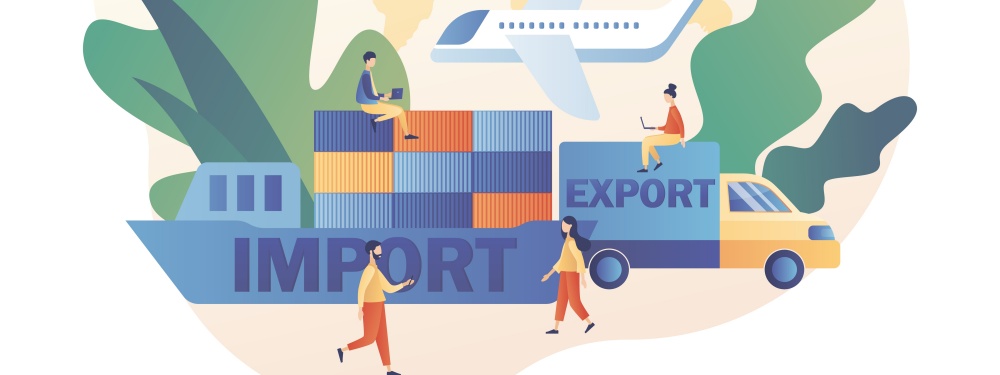
Overview

Lesson List
1. Overview of Trade
In this lesson, you will learn why trade transactions occur worldwide, the benefits of engaging in trade, its impact on employment, and specific considerations when involved in actual trade transactions.
Trade plays a crucial role in global economic activities, and various regulations are established to facilitate transactions between countries worldwide.
Let’s deepen our interest in trade by learning about these regulations.
Learning Target & Contents

Learning Target
・Students:★★★
・Manufacturer:★★★
・Trading Company:★★★
・Forwarder:★★★
・Customs Broker:★★★
Contents
・What Trade Is
・Regulations & Risks
2. Trade Transactions
In this lesson, we will delve into the fundamentals of international trade and explain the key players involved and their roles in trade transactions. As numerous trading methods exist in International Trade, we will learn how to utilize them effectively.
In the article on parallel importing, you can also learn about regulations to be mindful of, specific selling methods, and promotional techniques.
Learning Target & Contents

Learning Target
・Students:★★
・Manufacturer:★★★
・Trading Company:★★★
・Forwarder:★★
・Customs Broker:★★
Contents
・Players in Trade
・Types of Trade
・About Triangular Trade
・About Parallel Importing
3. Incoterms
In this lesson, we will explore Incoterms.
In international trade, it is essential to establish clear terms between exporters and importers regarding the responsibility for transportation costs and risks.
Incoterms are updated every ten years. The information conveyed in this lesson is based on the latest Incoterms 2020 for a comprehensive explanation.
Learning Target & Contents

Learning Target
・Students:★★
・Manufacturer:★★★
・Trading Company:★★★
・Forwarder:★★★
・Customs Broker:★★★
・Longshoreman:★★★
Contents
・What Incoterms is
・E Group – EXW
・F Group – FOB/FCA/FAS
・C Group – CFR/CIF/CPT/CIP
・D Group – DAP/DPU/DDP
・How to Choose Incoterms
4. Cargo Insurance
In this lesson, we will cover marine insurance.
International shipping involves various risks, and it is essential to safely transport purchased goods to their destination while hedging against these risks.
We will discuss the extent of coverage provided by marine cargo insurance, along with details such as the duration and conditions for filing insurance claims and specific guidelines on interpreting insurance documents.
Learning Target & Contents

Learning Target
・Students:★
・Manufacturer:★★★
・Trading Company:★★★
・Forwarder:★★
・Customs Broker:★★
・Longshoreman:★★
Contents
・Overview of Cargo Insurance
・Institute Cargo Clauses & Insurance Policy
・How to Read Insurance Policy
5. Payment Method
In this lesson, we will explore payment methods in trade transactions.
Dealing with foreign companies involves physical distance, and collecting payment in case of issues may not be straightforward.
When engaging in transactions with a company for the first time, there are payment methods that consider risks. Let’s learn together to actively utilize these methods.
Learning Target & Contents

Learning Target
・Students:★
・Manufacturer:★★★
・Trading Company:★★★
・Forwarder:★★
・Customs Broker:★★
・Longshoreman:★
Contents
・Overseas Remittances
・D/P, D/A, and L/C
6. Currency Exchange
In this lesson, we will learn about “foreign exchange” in trade transactions.
While the primary currency used in international trade transactions is the U.S. Dollar, the exchange rate with the domestic currency can significantly impact a company’s earnings.
We will discuss the market conditions, interactions with banks, and specific methods to avoid foreign exchange rate risks.
Learning Target & Contents

Learning Target
・Students:★
・Manufacturer:★★★
・Trading Company:★★★
・Forwarder:★★
・Customs Broker:★
・Longshoreman:★
Contents
・Exchange Risk & Forward Contracts
・How to Avoid Exchange Risk
7. Contracts
This lesson will delve into the contracts used in trade transactions. Once negotiations between the exporter and importer are concluded, it is necessary to document the agreed-upon terms in a contract.
Let’s understand the overall landscape, including sales contracts, and explore the various types of contracts.
Additionally, we will provide guidance on how to read contracts. While comprehending everything at once might be challenging, this knowledge will be useful when dealing with contracts in your routine business activities.
Take advantage of this information to enhance your understanding.
Learning Target & Contents

Learning Target
・Students:★
・Manufacturer:★★★
・Trading Company:★★★
・Forwarder:★★
・Customs Broker:★
・Longshoreman:★
Contents
・Contracts in Trade
8. Maritime Transport
In international shipping, over 90% of transportation occurs via maritime routes, with container shipping constituting a significant portion. In the midst of the COVID-19 pandemic, there were delays and disruptions in the supply chain, causing significant impacts.
This lesson primarily focuses on maritime transportation using container ships.
We provide detailed explanations of the specific document names, their roles, and how to effectively utilize them in practical scenarios. We recommend revisiting and reviewing the content multiple times to enhance your learning experience!
Learning Target & Contents

Learning Target
・Students:★
・Manufacturer’:★★
・Trading Company:★★
・Forwarder:★★★
・Customs Broker:★★
・Longshoreman:★★
Contents
・Overview of Maritime Transport
・Liner Service & Tramp Service
・Ocean Freight Caluculation
・How to Read Vessel Schedule
・B/L Issue Flow
・Four Types of B/L
・Triangular Trade & Switch B/L
・About Letter of Guarantee
・Dangerous Goods Sea Transport
・Documents for Sea Transport
9. Air Transport
When transporting urgent or delicate cargo such as emergency goods, fresh produce, or precision equipment, “”air transport”” is employed.
Air transport has unique characteristics, and speed is emphasized compared to maritime transport.
Furthermore, the calculation method for air freight charges may be complex, but it is crucial to remember. Since this calculation is highly important in practical scenarios, let’s learn together through this content.
Learning Target & Contents

Learning Target
・Students:★
・Manufacturer:★★
・Trading Company:★★
・Forwarder:★★★
・Customs Broker:★★
・Longshoreman:★
Contents
・Overview of Air Transport
・Features of AirWaybill
・How to Calculate Air Freight
・Transporting Dangerous Goods by Air
10. Export Clearance
In this course, we will learn about export customs clearance in maritime and air transport.
It’s essential to understand that not everything can be exported overseas. There are regulations in place that anticipate cases where the exported goods or technology may be used for military purposes.
We will also provide explanations of the specific processes involved in customs clearance for maritime and air transport. Let’s ensure a thorough understanding, as it can be useful in real-world scenarios.
Learning Target & Contents

Learning Target
・Students:★
・Manufacturer:★★
・Trading Company:★★
・Forwarder:★★★
・Customs Broker:★★★
・Longshoreman:★
Contents
・Export Control Laws
・Customs Procedures in Maritime Export
・Customs Procedures in Air Export
・AEO Program for Export
11. Import Clearance
This lesson will teach us about import customs clearance regulations, processes, and tariffs.
Generally, import customs clearance tends to be more complex and stringent than export customs clearance.
This aims to verify whether the products imported into our country comply with the correct regulations and to ensure the collection of taxes, which contribute to the country’s revenue.
In practical business situations, it is common for cargo to be held at the port if import permission is not obtained.
Until the permission is granted, excess storage charges will be incurred at the port, which may lead to trouble. Therefore, acquiring the correct knowledge and preparing for import clearance beforehand is crucial.
Learning Target & Contents

Learning Target
・Students:★
・Manufacturer:★★
・Trading Company:★★
・Forwarder:★★
・Customs Broker:★★★
Contents
・Import Control Laws
・Customs Procedures in Maritime Import
・Customs Procedures in Air Import
・Types of Tariffs & Calculation Methods



